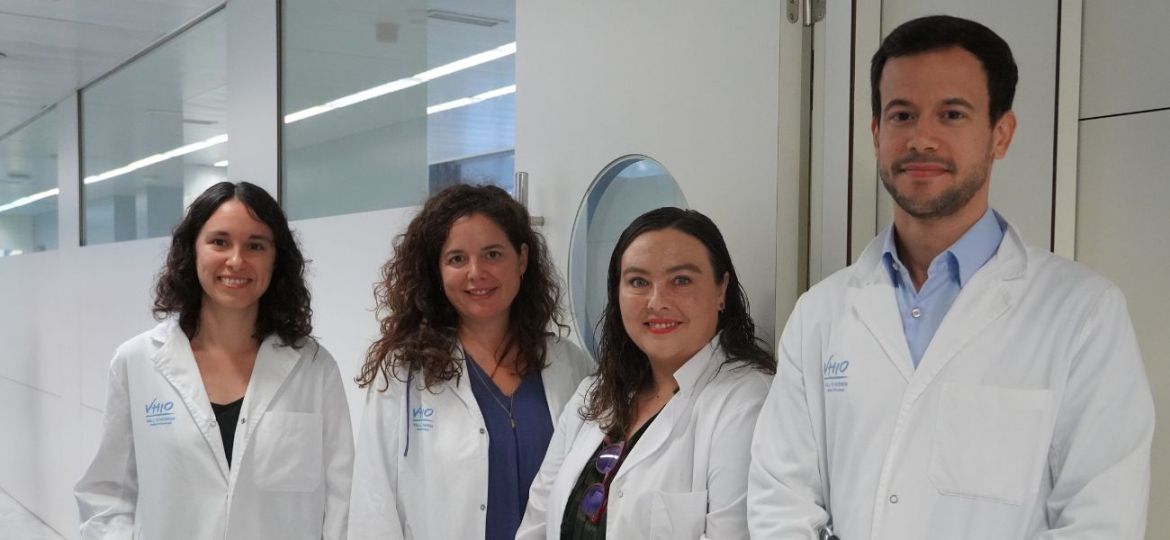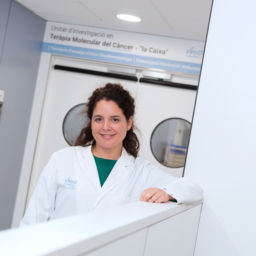
Co-authored by investigators of VHIO’s Cancer Genomics Group and Research Unit for Molecular Therapy of Cancer (UITM) – CaixaResearch, results of a study recently published open access as an Original Report in the journal JCO Precision Oncology1 show that in the clinical trial context, combined analysis of the inflammatory status of the tumor microenvironment classified by the VIGex gene expression signature and circulating tumor DNA (ctDNA) by liquid biopsy may improve response prediction to immunotherapy in patients with advanced solid tumors.
Predictive biomarkers of immunotherapy response
Immunotherapy is a type of cancer treatment that boosts the immune system to fight cancer by helping it to recognize and attack tumor cells. While this therapeutic strategy continues to revolutionize the treatment of an increasing number of tumor types, only a small fraction of biomarker-selected patients will benefit from immunotherapy.
“Cancer immunotherapy fails to achieve clinical responses in all patients and does not yield benefit in the treatment of many tumor types. There is therefore an unmet clinical need to identify robust biomarkers predictive of response to immune-based treatments,” said Elena Garralda, Medical Oncologist at the Vall d’Hebron University Hospital (HUVH), Director of VHIO’s UITM-CaixaResearch, and a co-author of this present study.
“In this context, immune gene expression signatures are emerging as potential biomarkers of response for immunotherapy. At VHIO, we have developed the VIGex gene expression signature as a predictive tool to help guide patient selection for immunotherapy,” observed Ana Vivancos, Head of VHIO’s Cancer Genomics Group and a co-author of this study.
VIGex is an immune gene signature based on the expression level of 12 key genes implicated in adaptive immune responses that has been developed in both Nanostring and RNA sequencing platforms and analytically validated in Ana Vivancos’ laboratory and at the Princess Margaret Cancer Centre in Toronto. This novel tool classifies tumor samples into three categories based on the inflammatory status of the tumor microenvironment: hot, intermediate-cold (I-Cold) and cold subgroups. VIGex-Hot has been associated with better with better immunotherapy outcomes2.
Combined VIGex and liquid biopsy analysis
This present study is the result of an international collaboration between investigators at VHIO and colleagues at the Princess Margaret Cancer Centre including Philippe Bedard, Clinical Director of Cancer Genomics, and Lillian Siu, Medical Oncologist and Director of its Phase I Program. The researchers analyzed the performance of VIGex and other biomarkers of response to immunotherapy in an independent data set of patients treated with pembrolizumab in the INSPIRE phase II clinical trial which was conducted at the Princess Margaret Cancer Centre and directed by Lillian Siu. Findings show that the VIGex-Hot subgroup was associated with higher overall survival and progression-free survival.
“We investigated the combined performance of ctDNA changes and other biomarkers including tumor mutational burden, PD-L1 expression using immunohistochemistry, and levels of ctDNA by liquid biopsy. We have found that the use of VIGex categorization of tumor samples pre-treatment and analysis of changes in ctDNA dynamics detected by liquid biopsy improves prediction of response to immunotherapy,” said Alberto Hernando-Calvo, Medical Oncologist at Vall d’Hebron, Core Phase 1 Investigator of VHIO’s UITM-CaixaResearch, and first author of this study.
“If a patient’s tumor sample pre-treatment with immunotherapy was classified as VIGex-Hot and a decrease in the quantity of ctDNA in plasma was observed during the first two treatment cycles compared with baseline, this associated with greater clinical benefit,” added Hernando-Calvo, who is also an investigator of VHIO’s Cancer Genomics Group.
Next steps to biomarker validation
“While our findings provide proof-of-principle for the combined use of VIGex classification and ctDNA dynamics to improve immunotherapy response prediction, these results are retrospective. Future prospective studies are required to establish the clinical utility of this approach for patient selection and guiding tailored immunotherapy treatment decisions,” said Alberto Hernando-Calvo.
Sponsored by the European Organisation for Research and Treatment of Cancer (EORTC) and the Asociación Española Contra el Cáncer – AECC (Spanish Association Against Cancer), a phase III clinical trial led by Irene Braña, Head of VHIO’s Head and Neck Cancer Group, has been designed to assess the efficacy of immunotherapy plus radiotherapy in patients with squamous cell carcinoma of the head and neck. As part of this study, the use of VIGex and ctDNA dynamics by liquid biopsy will be evaluated to prospectively establish the clinical utility of this predictive biomarker combination for patient selection or treatment de-escalation strategies.
Alberto Hernando-Calvo recently received a Gilead Research Grant for a project that aims to prospectively validate the VIGex gene expression signature as a predictive biomarker of immunotherapy response in the context of phase I immuno-oncology clinical trials.
This research was supported by the Sociedad Española de Oncología Médica – SEOM (Spanish Society for Medical Oncology), CRIS contra el cáncer (CRIS Cancer Foundation), Fundación BBVA (BBVA Foundation) Comprehensive Program of Cancer Immunotherapy and Immunology (CAIMI I and II), ”la Caixa” Foundation CaixaResearch Advanced Oncology Research Program, and the Fundación FERO (FERO Foundation) Advanced Molecular Diagnostics Program (DIAMAV). These last three funding sources are VHIO’s Institutional Programs supported by our private patrons. This project was also awarded a Princess Margaret Cancer Centre Fellowship, University of Toronto (Canada).
References
1. Hernando-Calvo A, Yang SYC, Vila-Casadesús M, Han M, Liu ZA, Berman AHK, Spreafico A, Razak AA, Lheureux S, Hansen AR, Lo Giacco D, Abbas-Aghababazadeh F, Matito J, Haibe-Kains B, Pugh TJ, Bratman SV, Aleshin A, Berche R, Saavedra O, Garralda E, Elston S, Siu LL, Ohashi PS, Vivancos A, Bedard PL. Combined Transcriptome and Circulating Tumor DNA Longitudinal Biomarker Analysis Associates With Clinical Outcomes in Advanced Solid Tumors Treated With Pembrolizumab. JCO Precis Oncol. 2024 Aug;8:e2400100. doi: 10.1200/PO.24.00100.
2. Hernando-Calvo A, Vila-Casadesús M, Bareche Y, Gonzalez-Medina A, Abbas-Aghababazadeh F, Lo Giacco D, Martin A, Saavedra O, Brana I, Vieito M, Fasani R, Stagg J, Mancuso F, Haibe-Kains B, Han M, Berche R, Pugh TJ, Mirallas O, Jimenez J, Gonzalez NS, Valverde C, Muñoz-Couselo E, Suarez C, Diez M, Élez E, Capdevila J, Oaknin A, Saura C, Macarulla T, Galceran JC, Felip E, Dienstmann R, Bedard PL, Nuciforo P, Seoane J, Tabernero J, Garralda E, Vivancos A. A pan-cancer clinical platform to predict immunotherapy outcomes and prioritize immuno-oncology combinations in early-phase trials. Med. 2023 Oct 13;4(10):710-727.e5. doi: 10.1016/j.medj.2023.07.006. Epub 2023 Aug 11.























